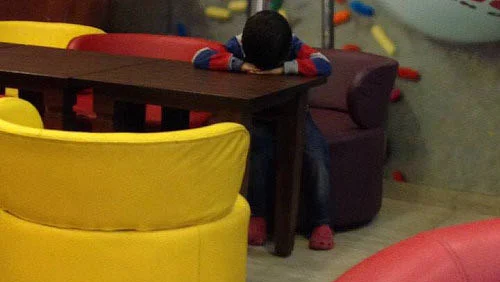We all tend to seek external intervention only when we’ve been pushed right to the brink and can no longer handle things on our own. Therefore, we self-medicate before we go to a doctor. We treat our own symptoms before we let others look at us. Disability and disorders today are unfortunately being dealt with the same way. Of course, if a child’s disability is in your face––if the child is physically challenged––one cannot hide him. One can, however, easily hide a child who is conspicuous only by his behaviour.
It is very easy to ignore a behaviour deficit––in fact, most parents do not accept or acknowledge or even understand that there is a behaviour issue. A child with no eye contact is called shy. A child with delayed speech/language an introvert. A child unable to communicate with others, is rebuked as being indisciplined and spoilt––while a child with echolalia is written off as a compulsive talker. All kinds of adjectives are found to explain away behavioural deficits––all except as symptoms of a disorder.
The real problems begin when these children go to school and cannot fit in. When kids are mean to them and people around you start to make faces at your child’s ‘out-of-place’ behaviour. At this point, typically two things happen. Parents either stop taking their kids out, or they start handling them with ‘forced discipline’. Only a few have the foresight to address these issues with professional help.
LOOK FOR THE SIGNS & TAKE THEM SERIOUSLY!!!
I remember how, during one of our visits to the paediatric psychiatrist, I had met with this woman who was looking after her grandson in the play room while his parents talked to the doctor. She asked me in wonder: “Aapka buccha to bolta hai phir kyoon aaye ho yahan?” ( Your child talks! Why then are you here? )
“Aapki generation se wait nahi hota––bahut expectations hain buchche se––ab har koi Einstein to nahi ban jata!!” What she meant was that we were an impatient lot of parents, running our own parenting programmes and expecting our children to be geniuses. While this could effectively be true for a majority of us who send our kids to multiple classes, expecting abnormally high IQs, what this woman was doing was blaming everything from nuclear families to busy parenting for behavioural deficits. That’s where we go wrong––we address a disorder only when it is full blown and in our faces. Often we insist the condition can be lived with and refuse to intervene. The worst thing you can do to your child is “waiting and watching.” Take action today! Early intervention can even bring a child out of the spectrum.
Let me list a few red flags as I end today’s post.
In Babies & Toddlers:
* Doesn’t make eye contact (e.g. look at you when being fed).
* Doesn’t smile when smiled at.
* Doesn’t respond to his or her name or to the sound of a familiar voice.
* Doesn’t follow objects visually.
* Doesn’t point or wave goodbye or use other gestures to communicate.
* Doesn’t follow the gesture when you point things out.
* Doesn’t make noises to get your attention.
* Doesn’t initiate or respond to cuddling.
* Doesn’t imitate your movements and facial expressions.
* Doesn’t reach out to be picked up.
* Doesn’t play with other people or share interest and enjoyment.
* Doesn’t ask for help or make other basic requests.
In Toddlers & Older Children:
* Appears disinterested or unaware of other people or what’s going on around them.
* Doesn’t know how to connect with others, play, or make friends.
* Prefers not to be touched, held, or cuddled.
* Doesn’t play “pretend” games, engage in group games, imitate others, or use toys in creative ways.
* Has trouble understanding or talking about feelings.
* Doesn’t seem to hear when others talk to him or her.
* Doesn’t share interests or achievements with others (drawings, toys).
* Speaks in an abnormal tone of voice, or with an odd rhythm or pitch that sounds odd in context.
* Repeats the same words or phrases over and over again.
* Responds to a question by repeating it, rather than answering it.
* Refers to themselves in the third person.
* Uses language incorrectly (grammatical errors, wrong words).
* Has difficulty communicating needs or desires.
* Doesn’t understand simple directions, statements, or questions.
* Takes what is said too literally (misses undertones of humour, irony, and sarcasm).
Reference- helpguide.org
(Mugdha Kalra is a former TV Journalist now happily grappling with a five-year old in the autism spectrum. She writes about her experiences in her blog.)
(At The Quint, we question everything. Play an active role in shaping our journalism by becoming a member today.)
